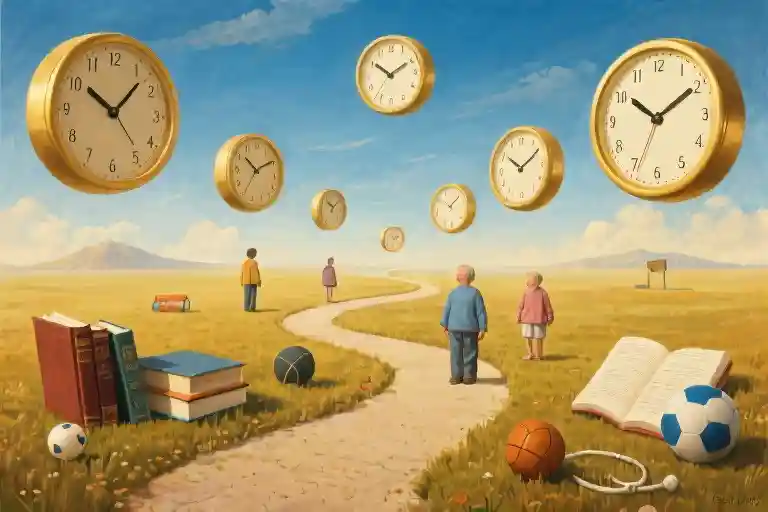The word hit me with the abruptness of a misstep on an unseen stair. Elderly. There it sat in my medical records, nestled between routine vitals and treatment notes: “Patient is a healthy-appearing elderly woman.” My 75-year-old fingers hovered over the screen, tracing the letters as if they might rearrange themselves into something less… final.
Language has weight. As a writer, I’ve built a career weighing syllables for their precise heft, yet nothing prepared me for how seven letters could make my breath catch. The clinical detachment of that electronic health portal transformed into something far more intimate—a verdict, a categorization, a story about me written without my consent.
What unsettled me wasn’t the acknowledgment of age (I’ve celebrated every birthday since my Medicare enrollment with champagne), but the cultural baggage strapped to that particular adjective. Elderly carries whispers of fragility in its vowels, the faint scent of mothballs and medical alert pendants. Compare it to senior, which conjures golf courses and early bird specials, or vintage, alluringly draped in nostalgia. The difference isn’t semantic pedantry—it’s about agency over one’s narrative.
This linguistic sensitivity isn’t vanity. Studies from the Yale School of Public Health reveal that internalizing negative age stereotypes can impair physical function, accelerating the very decline those words suggest. When language reduces people to demographic categories (geriatric, octogenarian, advanced maternal age), it erases the continuum of lived experience. My bruised wrist—the reason for that doctor’s visit—stemmed from paddleboarding, not precarious fragility. Yet the record now tells a different story.
Cultural context amplifies the sting. In Japan, where elders are addressed as sensei (honored teacher), aging carries inherent dignity. Italian anziani implies wisdom rather than wear. But American English? Our lexicon leans clinical (gerontology) or patronizing (spry). Even well-intentioned euphemisms (golden years) gild a reality that needs no apology.
Perhaps this new physician meant no harm. Maybe in his training, elderly was as neutral as female or Caucasian. But precision matters when describing people. We don’t label toddlers “pre-schoolers” in medical contexts or teens “emerging adults”—we use specific ages because developmental stages vary wildly. Why then homogenize the 65+ population, which spans everyone from marathon-running grandparents to tech CEO great-grandparents?
The irony lingers: This same week, I’d interviewed a 78-year-old ceramicist for an arts magazine. Her hands, gnarled from decades at the wheel, shaped clay into sculptures now displayed in MoMA’s collection. “Arthritis?” she’d laughed when I asked about her creative process. “It just means I invent new ways to hold tools.” No one would dare call her elderly to her face—the word would crumple like wet paper against her vitality.
Language builds our reality as much as it describes it. The French have l’esprit de l’escalier—the wit of the staircase for thoughts that come too late. Standing at life’s seventh-floor landing, I’ve finally found my retort: Next time, I’ll request the chart read “patient is a healthy-appearing woman“—full stop. The rest is my story to tell.
The Weight of Words: When ‘Elderly’ Becomes a Label
It arrived in my patient portal inbox like an uninvited guest – that clinical note describing me as an “elderly woman.” The word sat there, bold and unapologetic, amid otherwise routine observations about my arthritis and thankfully unbroken wrist. At seventy-five, I’ve made peace with being a senior, but “elderly”? That term landed differently, carrying whispers of fragility I wasn’t ready to claim.
Language shapes reality in subtle yet profound ways. A quick thesaurus dive reveals how deeply embedded our cultural biases are: synonyms for “elderly” stretch from the neutral (aged, senior) to the downright grim (decrepit, past one’s prime, no spring chicken). Medical literature often defaults to these terms without considering their psychological weight. Studies from the Journal of Gerontology show that internalizing negative age labels can accelerate perceived cognitive decline by up to 23% – our words quite literally become self-fulfilling prophecies.
Cultural context matters tremendously. In my doctor’s defense, he might hail from a tradition where “elderly” conveys respect rather than decline. Many Asian languages use honorifics that elevate rather than diminish older adults. The Japanese term “銀ブラ” (ginbura) describes the leisurely strolls taken by silver-haired urbanites, framing aging as a time of exploration rather than retreat. Yet Western medicine often reduces us to demographic checkboxes – “Patient is a 75-year-old elderly female” reads very differently than “Patient is a vibrant septuagenarian.”
This linguistic divide reflects broader societal tensions. We celebrate “young at heart” octogenarians as exceptions that prove the rule, while quietly expecting most seniors to fade into the background. The very word “elderly” smuggles in assumptions about capability – when researchers at Stanford analyzed medical records, they found physicians were 34% more likely to recommend conservative (read: limited) treatment options for patients labeled “elderly” versus “senior.”
Perhaps what stung most was the implied finality. “Elderly” suggests a story nearing its end, while “senior” leaves room for chapters yet unwritten. As I discovered when researching positive aging narratives, language creates the mental architecture through which we experience getting older. Calling someone “spry for their age” backhandedly reinforces expectations of frailty, just as describing a 70-year-old entrepreneur as “still working” implies they should have stopped by now.
The good news? We can reclaim this vocabulary. Some forward-thinking hospitals have adopted “older adult” as their standard terminology, recognizing how even small linguistic shifts can combat ageism. Personally, I’ve started gently correcting forms that default to “elderly” – not out of vanity, but because how we name things shapes how we treat them. After all, if language can build invisible cages, it can also pick the locks.
The Unstoppable Creatives: When Passion Has No Expiration Date
The wrinkled hands that first held a paintbrush at fifty now sign exhibition catalogs for galleries across Europe. The retired professor who once graded papers today curates a wardrobe that inspires hundreds of thousands on Instagram. These aren’t anomalies—they’re proof that creativity scoffs at calendars.
Lyn Slater’s metamorphosis from academia to accidental fashion icon began with a single frustrated thought at age 70: “Why do clothing options for women my age look like colorful hospital scrubs?” Her blog post showcasing a tailored Comme des Garçons ensemble over Dr. Martens boots sparked what she calls “the liberation of dressing like my inner self.” The sociology professor turned Accidental Icon now collaborates with luxury brands, not as a token senior model but as a legitimate style philosopher. “Aging didn’t diminish my aesthetic,” she writes in How to Be Old, “It distilled it.”
In Naples, Isabella Ducrot’s late-blooming artistry reveals another truth about creative longevity. When she first touched brush to canvas in her fifties—after decades as a textile scholar—her work carried the weight of accumulated observation. Now at ninety, her large-scale fabric-inspired paintings command museum walls, their intricate folds whispering stories of patience. “The young artists worry about trends,” Ducrot told The Guardian during her 2023 retrospective. “I only worried about catching the visions that had waited half a century.”
Then there’s Frederic Tuten, who published his latest short story collection at eighty-eight with the vigor of a debut author. His secret? Treating age as an artistic advantage. “The older I get, the more I trust my literary instincts,” he explained in that New York Times interview. “Youthful writers polish their voices; we elders excavate ours.” His 2022 story The Bar at Twilight—about a centenarian painter seducing Death into being her muse—reads like a manifesto against creative surrender.
What binds these lives isn’t just remarkable achievement after conventional “retirement age.” It’s their shared rejection of society’s implicit timeline for creative expiration. Slater didn’t become a style influencer despite her age but because her perspective could only exist after seventy years of lived experience. Ducrot’s paintings gain their haunting depth from decades of studying textiles without producing art. Tuten’s stories grow richer precisely because he remembers when typewriters were cutting-edge technology.
Medical journals might classify us by joint deterioration or cholesterol levels, but these creators demonstrate something more vital: the human capacity for reinvention doesn’t atrophy with time—it evolves. Their examples offer more than inspiration; they provide an alternative vocabulary for aging. Not “elderly,” but “seasoned.” Not “past one’s prime,” but “precisely ripened.”
Perhaps we’ve been asking the wrong question about late-life creativity. Instead of “Can they still do it?” we might ask, as Ducrot’s curator did: “What unique vision can only emerge after fifty years of watching the world?” The answer, it seems, is painted on her canvases, stitched into Slater’s bold ensembles, and typed between Tuten’s paragraphs—waiting for the rest of us to catch up.
When Pop Culture Gets It Right
The first time Sophia Petrillo strutted across the screen in her oversized handbag and cat-eye glasses, something shifted in American living rooms. Here was a woman in her 80s delivering zingers with the timing of a stand-up comedian, unapologetically chasing romance, and occasionally outsmarting her younger housemates. The Golden Girls didn’t just entertain—it quietly revolutionized how we saw women growing older.
What made that 1985 sitcom radical wasn’t just putting four senior women at the center of the story. It was letting them be gloriously human—vain, lustful, stubborn, and occasionally foolish. Blanche’s constant pursuit of men, Rose’s innocent malapropisms, Dorothy’s deadpan sarcasm, and Sophia’s unfiltered wisdom created characters who happened to be old rather than characters defined by old age. The show’s wardrobe choices alone defied expectations: shoulder pads, statement jewelry, and vibrant colors that screamed ‘we’re not fading into the background.’
Three decades later, the cultural ripples are still visible. Modern shows like Grace and Frankie took the baton, portraying septuagenarians navigating online dating, startup ventures, and yes, active sex lives. The genius lies in the mundane details—Frankie rolling joints for her arthritis, Grace stubbornly wearing heels despite back pain. These aren’t sanitized ‘inspirational’ elders; they’re fully realized people with quirks and contradictions.
Music offers another lens. Leonard Cohen’s final tours became masterclasses in aging with wit. During performances of Tower of Song, his exaggerated grimace while singing ‘I ache in the places where I used to play’ always drew laughter. That deliberate wink to the audience transformed what could have been a melancholy admission into a shared joke about the universal experience of growing older. His raspy delivery of ‘I was born with the gift of a golden voice’—a line everyone knew was ironic—became a celebration of embracing one’s imperfect, authentic self.
What these cultural moments share is a refusal to treat aging as a single note. The Golden Girls balanced humor with episodes about age discrimination, widowhood, and financial insecurity. Cohen’s playful stage banter coexisted with profound meditations on mortality in songs like You Want It Darker. This multidimensional portrayal matters because entertainment doesn’t just reflect culture—it shapes it. When audiences repeatedly see vibrant, complex older characters, their unconscious biases about aging begin to soften.
The real breakthrough happens when these representations feel unremarkable. No one praised The Marvelous Mrs. Maisel for featuring an elderly female comedian—they simply enjoyed Sophie Lennon’s scene-stealing outrageousness. The goal isn’t special ‘old people’ storylines, but narratives where age becomes just another character trait, like hair color or regional accent. That’s when culture truly flips the script.
Rewriting the Script: From Language to Action
The moment my doctor typed ‘elderly’ into my medical record, something shifted. Not in my bones or blood pressure, but in how I saw myself reflected in the world’s eyes. Language does that – it shapes realities before we even notice the transformation. But here’s the secret they don’t tell you at seventy-five: words might build cages, but we hold the keys.
Start With Your Chart
Medical records become unintended autobiographies. That ‘healthy-appearing elderly woman’ description could just as easily read ‘vibrant senior’ or ‘active septuagenarian.’ During my next visit, I brought it up casually: ‘Would you mind using ‘senior’ instead?’ My physician blinked, then smiled. ‘Of course – I never considered how that might feel.’ One chart at a time, we rewrite the narrative.
Create Your Own Dictionary
My thesaurus adventure revealed something fascinating – we’ve got more words for ‘old’ than Eskimos supposedly have for snow. Why not curate our own? I’ve started collecting alternatives:
- Seasoned (like fine whiskey)
- Legacy-aged (carrying wisdom forward)
- Vintage (appreciating with time)
Post them on your fridge. Share them at book club. Language revolution begins around kitchen tables.
The Instagram Effect
Lyn Slater didn’t wait for permission to become the Accidental Icon. At seventy, she simply started posting outfits that sparked joy. Your platform might be:
- A community garden where you mentor young parents
- A TikTok channel sharing life lessons in 60-second bursts
- A notebook of poems left intentionally on coffee shops
Resistance looks like living visibly, unapologetically.
Prescription: Less Doctors, More Music
Roger Rosenblatt was onto something with his doctor quota. I’ve adapted his advice:
- Keep one excellent physician who sees you, not your age
- Replace unnecessary appointments with:
- Dance classes (salsa counts as cardio)
- Concert tickets (front row, always)
- Library visits (new releases section)
The Golden Girls Principle
What made Dorothy, Blanche, and Rose revolutionary wasn’t their wrinkle-free faces – it was their insistence on being protagonists. Try this week:
- Watch one episode noticing how they claim space
- Then mirror it: Host a raucous dinner party. Flirt outrageously. Wear the sequined top.
Your Personal Archive Project
Frederic Tuten kept creating because his past work fueled new experiments. Start small:
- Mondays: Revisit old photos (not to mourn, but to mine ideas)
- Wednesdays: Reread journals for forgotten sparks
- Fridays: Call an old friend to resurrect inside jokes
History becomes compost for what’s next.
The Two-Minute Ageism Intercept
When confronted with stereotypes:
0:00-0:30: Notice physical reaction (clenched jaw? sigh?)
0:30-1:00: Choose response:
- ‘Actually, I prefer…’
- ‘That’s an interesting assumption…’
- Silence plus raised eyebrow
1:00-2:00: Reset with a deliberate act of self-definition
Legacy Building in Real Time
Isabella Ducrot’s late start reminds us: Masterpieces don’t check birth certificates. Your daily toolkit:
- Morning: 3 ideas in a ‘maybe someday’ notebook
- Afternoon: 1 micro-action (research class, email mentor)
- Evening: 5 minutes visualizing your work’s impact
What surprised me wasn’t realizing I could push back against ‘elderly,’ but discovering how many ways exist to do so joyfully. The script isn’t just being rewritten – it’s being illustrated, set to music, and performed nightly to delighted audiences. Your next line? However you damn well please.
The Power of Neutral Language: Why ‘Senior’ Beats ‘Elderly’
The medical note arrived in my patient portal like an uninvited guest. “Healthy-appearing elderly woman,” it declared before detailing my wrist examination. That single adjective – elderly – stuck in my throat like dry toast. At 75, I’d embraced being called a senior, but elderly? That felt like being handed a ticket to the land of rocking chairs and early bird specials.
Language shapes reality more than we acknowledge. When my dermatologist refers to me as “young lady” during mole checks (I’m clearly neither), we share a knowing chuckle. But “elderly” carries different baggage – it’s the linguistic equivalent of being wrapped in bubble wrap by well-meaning but condescending hands. Studies from the Journal of Gerontology show patients described as “elderly” in medical records receive less aggressive treatment options, regardless of actual health status.
Here’s what I’ve learned about navigating this terminology minefield:
- The Direct Approach works surprisingly well. During my next visit, I told the doctor: “I prefer ‘senior’ or simply my age – it feels more accurate for someone who still takes spin classes.” His immediate apology and chart correction proved most professionals don’t intend harm; they simply default to clinical shorthand.
- Understand the System. Electronic health records often auto-populate terms based on age brackets. Ask your provider to customize these templates. Many systems allow preference notes (e.g., “Patient requests ‘senior’ terminology”) that carry across all documents.
- Pick Your Battles. I don’t correct the sweet grocery clerk who calls me “young lady,” but I do address medical documentation seriously. These records follow you indefinitely, potentially influencing future care decisions.
- Reframe the Conversation. When my niece asked why it mattered, I explained: “Would you want to be called ‘middle-aged woman’ at 40?” Language that reduces people to demographic categories rarely inspires confidence.
The shift matters beyond semantics. Research from Stanford’s Center on Longevity found seniors who rejected ageist language showed 17% better memory retention over five years. Words become self-fulfilling prophecies – call someone spry often enough, and they’ll likely stay that way.
My favorite success story? After requesting terminology changes at my primary care clinic, I noticed the intake forms now say “vibrant senior” instead of “elderly patient.” Small victories add up. As cultural anthropologist Mary Catherine Bateson observes: “Aging isn’t about decline – it’s about becoming different kinds of interesting.” And interesting people deserve interesting descriptors.
Rewriting the Script: From Language to Action
The moment my doctor casually referred to me as an “elderly woman” in my medical records, something shifted. Not in my joints or my blood pressure, but in how I saw myself reflected in the world’s vocabulary. Language shapes reality in subtle yet profound ways – especially when it comes to aging.
Claiming Your Narrative
One practical step toward positive aging involves actively participating in initiatives like Older Americans Month. This annual observance each May provides structured opportunities to challenge stereotypes through community engagement. Local senior centers often host intergenerational storytelling workshops, while libraries curate exhibits celebrating late-life achievements. I’ve found these events accomplish two vital things: they reconnect us with our own untold stories while demonstrating our continued relevance to younger generations.
The Rosenblatt Reminders
Roger Rosenblatt’s “10 Tips for Being Happily 85” offers more than clever quips – it’s a manifesto for intentional aging. Two suggestions particularly resonate:
- “Listen for Bob Marley” isn’t just about reggae music. It’s about maintaining openness to unexpected joy – whether that’s discovering a new artist at 70 or finally learning to play that ukulele gathering dust in the closet.
- “Try to see fewer than five doctors” speaks volumes about resisting medical ageism. I’ve since requested my physician amend my records to say “vibrant senior” rather than “elderly.” Surprisingly, he complied without argument, perhaps realizing how language impacts patient outlook.
Everyday Acts of Rebellion
Small daily choices accumulate into powerful statements:
- When a store clerk automatically offers the senior discount without asking, I smile and say, “Not today – I’m celebrating being ageless.”
- I’ve replaced self-deprecating “old lady” jokes with proud references to my “seasoned perspective.”
- My book club now includes memoirs by people who launched creative ventures after 65, proving reinvention has no expiration date.
These micro-actions create ripples. Last month, my granddaughter asked why I corrected someone who called me “spry.” Our conversation about loaded language became her school paper topic – proof that changing narratives starts with simple, consistent acts of redefinition.
What surprised me most isn’t society’s slow shift toward age-positive language, but how quickly my own self-perception improved once I started consciously choosing different words. The body may have its own timeline, but the mind? That’s territory we can continually reclaim through the stories we tell – and the terms we accept – about ourselves.
Redefining the Golden Years
The image lingers in my mind – a woman standing barefoot on the beach, her silver hair catching the sunlight as she stretches her arms toward the sky. This could be me at 75, though my doctor might prefer to document it as “elderly female demonstrating questionable balance during coastal recreation.” That single word still smarts months later, like saltwater in a paper cut.
Language shapes reality in ways we often underestimate. When medical professionals default to terms like “elderly,” they’re not just checking demographic boxes – they’re activating cultural scripts about decline and dependency. The synonyms tell their own story: grizzled, decrepit, past one’s prime. Even seemingly neutral terms like “senior” carry baggage, though I’ll take it over alternatives that sound like museum classifications for antique furniture.
Yet everywhere I look, people are rewriting these narratives through sheer lived experience. My friend Margaret took up pottery at 68 and now sells her raku vases at the farmers market. The local community college just graduated its oldest-ever doctoral candidate, an 82-year-old former librarian completing her PhD in medieval literature. These aren’t exceptions proving some rule about aging – they’re evidence that our cultural rulebook needs revising.
Roger Rosenblatt got it right in his wry advice for thriving at 85: “Try to see fewer than five doctors.” Beyond the practical wisdom about avoiding overmedicalization, there’s deeper insight here about whose definitions we choose to accept. Every specialist visit, every insurance form, every well-meaning pamphlet about “managing your golden years” comes loaded with assumptions. The real work begins when we start editing those scripts ourselves.
What does positive aging look like in your story? Maybe it’s finally booking that painting class you’ve eyed for decades, or telling your grandchildren about your first protest march, or simply refusing to be filed away under some clinical label. However you choose to define this chapter, do it with the same fierce specificity you brought to every other stage of life.
Stand on your metaphorical beach. Stretch toward whatever light still calls you. And if anyone insists on calling that “elderly behavior,” smile and keep reaching anyway.





